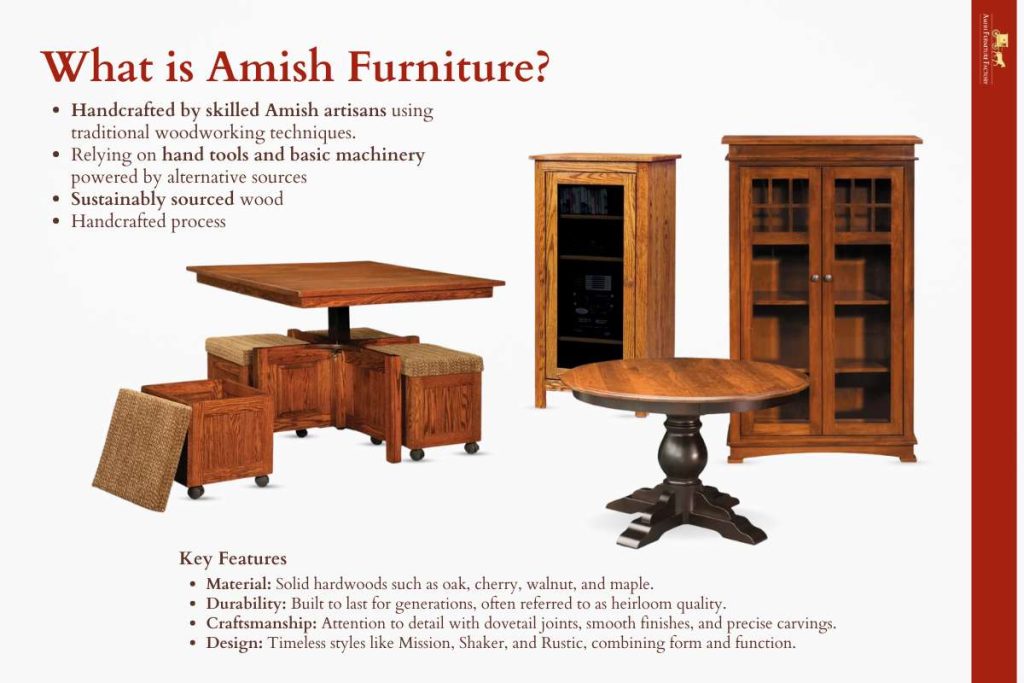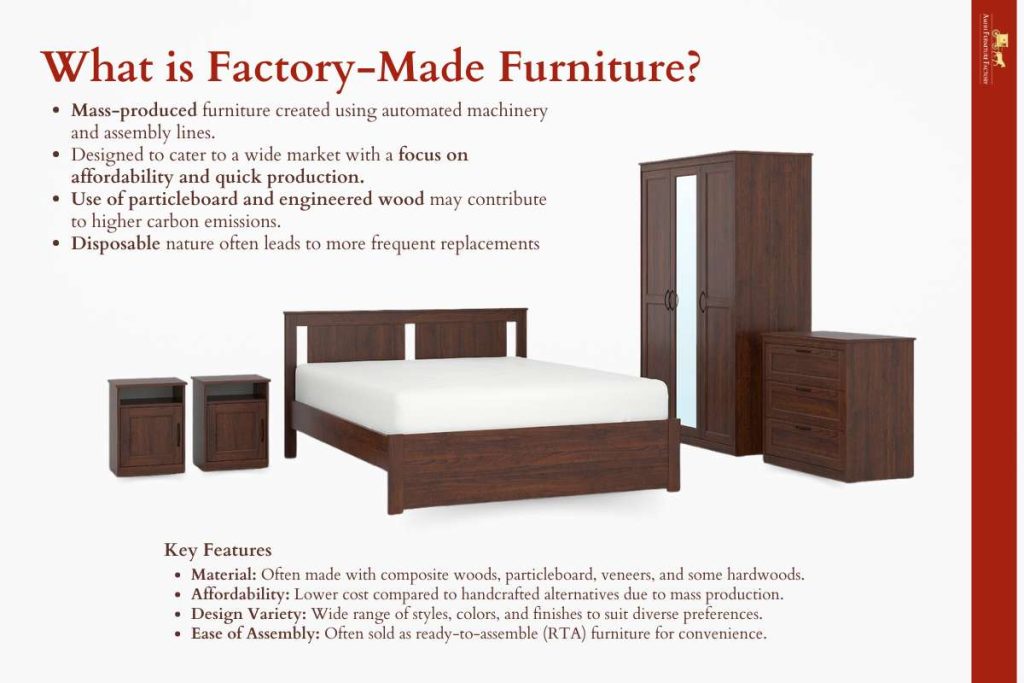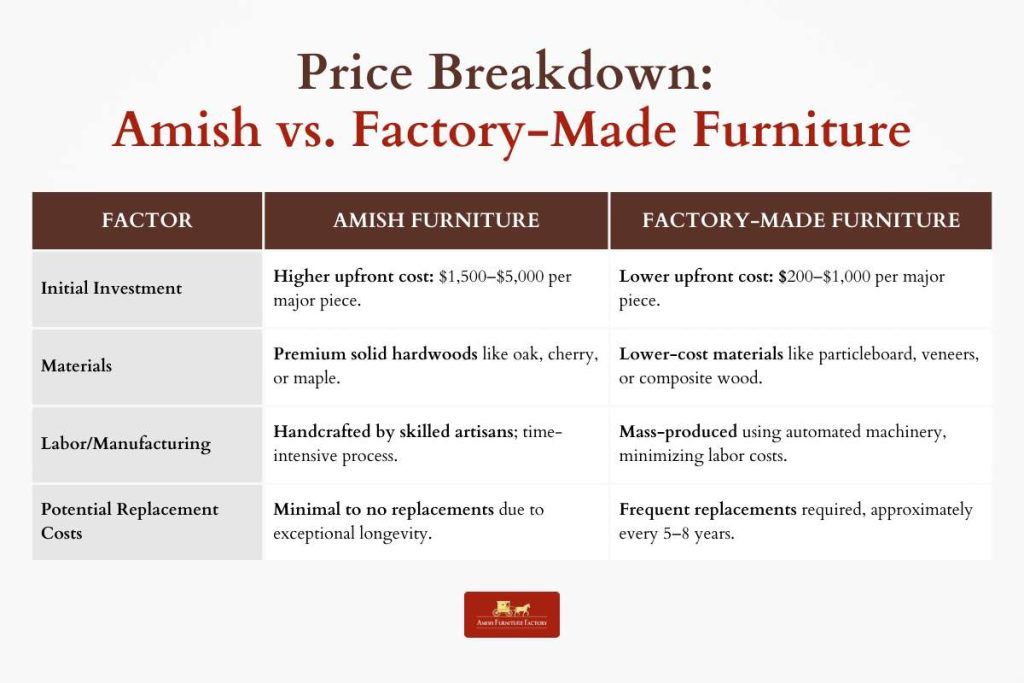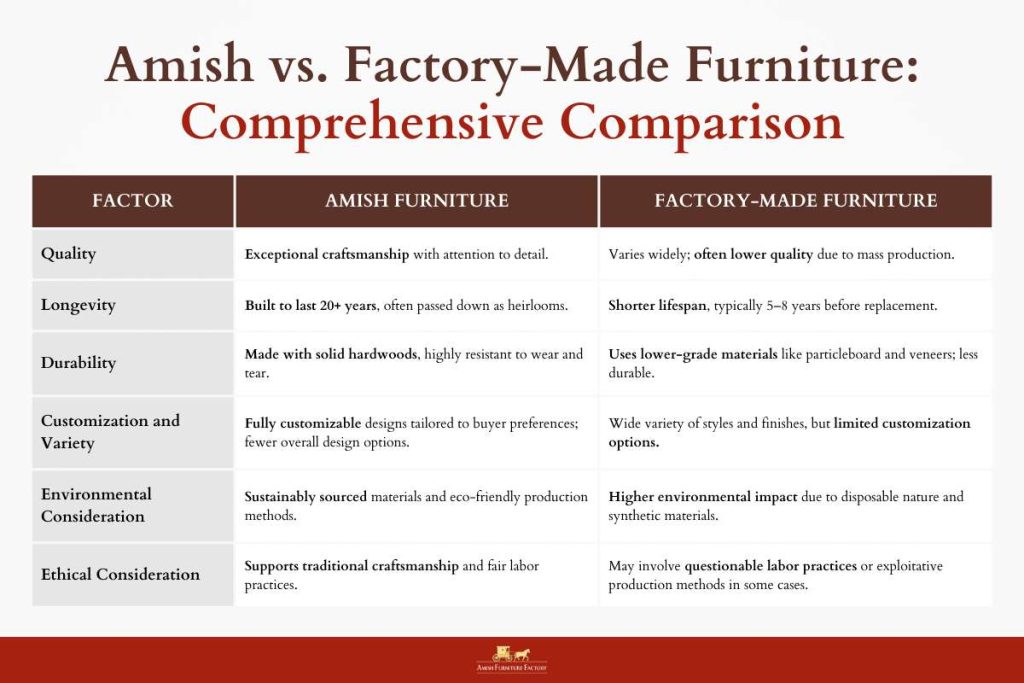
When it comes to furnishing your home, the choice between handcrafted Amish furniture and mass-produced pieces can spark some serious debate. Amish furniture is known for its incredible craftsmanship, timeless style, and durability, while factory-made options are all about affordability, variety, and convenience. But how do these two really compare when it comes to price, quality, and long-term value? Let’s find out in this detailed amish furniture vs factory made comparison.
Key Takeaways
- Amish furniture is a premium product, offering superior quality, durability, and customization.
- Factory-made furniture is more affordable but often compromises on quality and longevity.
- The decision between Amish and factory-made furniture depends on individual priorities, budget, and long-term goals.
This article will discuss amish furniture vs factory made comparison, shedding light on what each has to offer. Let’s explore how these two approaches to furniture making stack up, from the meticulous artistry of Amish carpenters to the assembly lines of modern factories.
Overview of Amish Furniture

Amish furniture, a testament to centuries-old craftsmanship, has captivated the hearts of furniture enthusiasts worldwide. Rooted in the simple living principles of the Amish community, their furniture-making tradition dates back to the 18th century. Skilled artisans, often working within the confines of their homes, meticulously craft each piece using time-honored woodworking techniques such as dovetail joints and mortise-and-tenon construction. The Amish prioritize the use of solid hardwoods, sourced sustainably from local forests. Oak, cherry, and maple are among the popular choices, renowned for their durability and natural beauty.
As Francisco Romero, a hardwood flooring industry expert, aptly states,
“Craftsmanship and material choice are king when it comes to quality and longevity. Amish furniture offers attention to detailed craftsmanship and quality wood selection, resulting in pieces that last for generations.“
Overview of Factory-Made Furniture

The industrial revolution ushered in an era of mass production, fundamentally transforming the furniture manufacturing landscape. Assembly-line production techniques enabled the rapid manufacturing of furniture at scale, making it accessible to a wider market. However, this shift towards efficiency often necessitated the use of less expensive materials such as particleboard and veneers. Automation and mechanization, while increasing production speed, have also resulted in a decline in craftsmanship standards. As a result, these pieces may exhibit signs of wear and tear more quickly, requiring replacement or repair sooner than their Amish counterparts.
As Steve Hyndman, an industry expert from Aztec Container, points out,
“Factory-made furniture typically offers lower upfront costs. However, these often come with trade-offs in terms of longevity and robustness, which can lead to higher replacement costs over time.”
Price Comparison
The price of furniture can vary significantly based on factors such as material quality, craftsmanship, and brand. Generally, Amish furniture tends to command a higher price tag compared to its factory-made counterparts. This premium is justified by the superior quality of materials, intricate craftsmanship, and the time-intensive nature of the production process. In contrast, factory-made furniture, while more affordable in the short term, may require more frequent replacements due to wear and tear.
As Steve Hyndman aptly notes, “A custom solution can be more costly initially but offers better outcomes. Professional customizations tend to provide greater satisfaction and resilience against wear and tear. My advice: weigh the upfront cost against long-term benefits, factoring in how individual needs align with quality craftsmanship versus mass production realities.“

Quality, Longevity, and Durability
Amish furniture offers a significant advantage in terms of quality, longevity, and durability compared to its factory-made counterparts. Primarily constructed from solid hardwood, Amish furniture is renowned for its resilience and resistance to wear and tear. Moreover, the meticulous craftsmanship employed by Amish artisans further enhances the structural integrity of each piece. Every detail, from the smooth finish to the intricate carvings, is meticulously crafted to ensure lasting beauty and functionality.
In contrast, factory-made furniture often relies on less durable materials such as particleboard, MDF, and veneers. These materials may not withstand the test of time, particularly in high-traffic areas or environments with fluctuating temperature and humidity. Additionally, mechanized production processes, while efficient, may compromise the quality and precision of the finished product. Limited customization options further restrict the ability to tailor the furniture to specific needs and preferences, potentially impacting its longevity.
Customization and Variety
One of the key differentiators between Amish and factory-made furniture lies in customization and variety. Amish furniture, being handcrafted, offers a high degree of customization. Customers can often work directly with artisans to specify dimensions, wood type, finish, and unique design elements. In contrast, factory-made furniture is typically produced in standardized designs with limited customization options. While this approach can be efficient, it may not cater to specific preferences or accommodate unique spaces.
As Francisco Romero shares, “Factory-made furniture, while often more affordable upfront, can lack the personalized touch and durability of handcrafted pieces. The choice between Amish and factory-made parallels decisions customers face when considering custom, durable wood solutions versus mass-produced alternatives in their homes.”
Environmental and Ethical Considerations
When considering furniture purchases, it’s essential to evaluate the environmental and ethical implications. Amish furniture often aligns with sustainable practices, prioritizing the use of locally sourced, sustainably harvested hardwoods. By minimizing transportation distances and supporting local economies, Amish furniture manufacturers contribute to a reduced carbon footprint.
In contrast, the mass production of factory-made furniture often involves the use of non-renewable resources and energy-intensive manufacturing processes. The upstream and core phases of furniture production, including plywood production and electricity consumption, contribute significantly to greenhouse gas emissions. A study has shown that these phases account for 26.2% and 15.5% of total emissions, respectively.
Here’s a detailed amish furniture vs factory made comparison:

Amish Furniture vs Factory Made Comparison: A Final Consideration
In conclusion, Amish furniture offers a compelling blend of quality, durability, customization, and sustainability. While the initial investment may be higher, the long-term benefits, including reduced replacement costs, increased property value, and a positive environmental impact, make it a worthwhile choice for discerning consumers.
Factory-made furniture, on the other hand, provides a more affordable option with a wider range of styles and finishes. However, it may compromise on quality, durability, and environmental impact. Ultimately, the decision between Amish and factory-made furniture depends on individual priorities and budget constraints.
Frequently Asked Questions
What makes Amish craftsmanship superior to factory production?
Amish craftsmanship is renowned for its attention to detail, quality, and durability. The use of high-quality, solid hardwoods ensures that Amish furniture can withstand the test of time. In contrast, factory-made furniture is often mass-produced using mechanized processes, which may compromise quality and durability.
How long can Amish furniture last compared to factory-made furniture?
Amish furniture, with its superior construction and materials, can last for generations. With proper care, these pieces can retain their beauty and functionality for decades. Factory-made furniture, while more affordable, may have a shorter lifespan due to the use of lower-quality materials and less robust construction techniques.
Are there eco-friendly benefits to choosing Amish furniture?
Yes, Amish furniture often aligns with sustainable practices. Amish artisans often source their materials locally and minimize waste through careful planning and efficient production methods.
Can factory-made furniture be as durable as Amish furniture?
While some high-end factory-made furniture may be durable, it generally doesn’t match the quality and longevity of Amish-crafted pieces. Amish furniture, with its solid wood construction and meticulous craftsmanship, offers superior durability and resistance to wear and tear.
